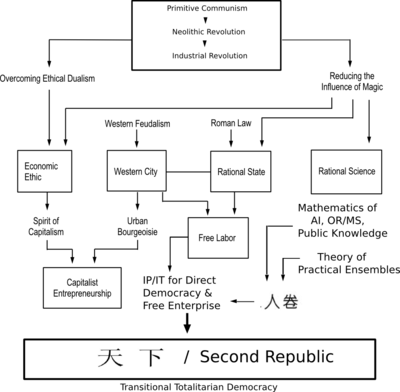Critique of Dialectical Reason: Difference between revisions
No edit summary |
|||
| (12 intermediate revisions by the same user not shown) | |||
| Line 1: | Line 1: | ||
[[:en:Critique of Dialectical Reason]] | [[:en:Critique of Dialectical Reason]] | ||
<table width=100%><tr><td style="background-color: | <table width=100%><tr><td style="background-color:#301934; color:white;"> | ||
{{Infobox book | {{Infobox book | ||
| name = Critique of Dialectical Reason | | name = Critique of Dialectical Reason | ||
| Line 33: | Line 33: | ||
==Introduction== | ==Introduction== | ||
The | The Theory of Practical Ensembles. | ||
=== The Dogmatic Dialectic and the Critical Dialectic === | === The Dogmatic Dialectic and the Critical Dialectic === | ||
| Line 69: | Line 69: | ||
=Volume II= | =Volume II= | ||
: ''Main:'' [[ | : ''Main:'' [[History and its totaliser]] | ||
[[File:ANS.png|thumb|400px|[[:en:Totalitarian democracy|The Intelligibility of History]].]] | |||
The Intelligibility of History | |||
== Is Struggle Intelligible? == | |||
=== Conflict, Moment of a Totalisation or Irreducible Rift? === | |||
=== Relations between the Individual Conflict and the Fundamental Conflicts of the Social Ensemble === | |||
=== Intelligibility of the Conflict within a Pledged Group === | |||
=== The Unresolved Struggle as Anti-Labour === | |||
=== Are Social Struggles Intelligible<br>(A Historical Study of Soviet Society) === | |||
== The Totalisation-of-Envelopment in a Directorial Society, Relations between the Dialectic and the Anti-Dialectic == | |||
=== Singularity and Incarnation of the Sovereign Process === | |||
=== Incarnation of the Sovereign as an Individual === | |||
=== The Spiral: Circularity and Alteration === | |||
=== The Three Factors of Unity === | |||
==See also== | ==See also== | ||
Latest revision as of 19:28, 19 May 2023
en:Critique of Dialectical Reason
Critique of Dialectical Reason, (French: Critique de la raison dialectique) (1960), (Volume I: Theory of Practical Ensembles) [1]was the last of Jean-Paul Sartre's major philosophical works: it attempts to use Existentialism as a foundational contribution to Marxism as described in Search for a Method, both of which were written as a common manuscript of some 755 pages with Sartre intending the Critique to logically precede Search[2]. The second volume with an incomplete treatment of the Stalinization of the Bolshevik revolution was published in French in 1985 and in English in 1992. Sartre is quoted as having said this was the principal of his two philosophical works for which he wished to be remembered.[3][4] Volume IIntroductionThe Theory of Practical Ensembles. The Dogmatic Dialectic and the Critical DialecticCritique of Critical InvestigationBook I - From Individual Praxis to the Practico-InertIndividual Praxis as TotalisationHuman Relations as Mediation between Different Sectors of MaterialityMatter as Totalised Totality: a First Encounter with NecessityCollectivesBook II - From Groups to HistoryThe Fused GroupThe Statutory GroupThe OrganizationThe Constituted DialecticThe Unity of the Group as Other: the MilitantThe InstitutionThe Place of HistoryClass Struggle and Dialectical ReasonVolume II
 The Intelligibility of History Is Struggle Intelligible?Conflict, Moment of a Totalisation or Irreducible Rift?Relations between the Individual Conflict and the Fundamental Conflicts of the Social EnsembleIntelligibility of the Conflict within a Pledged GroupThe Unresolved Struggle as Anti-LabourAre Social Struggles Intelligible
| |||||||||||||||||||||||
